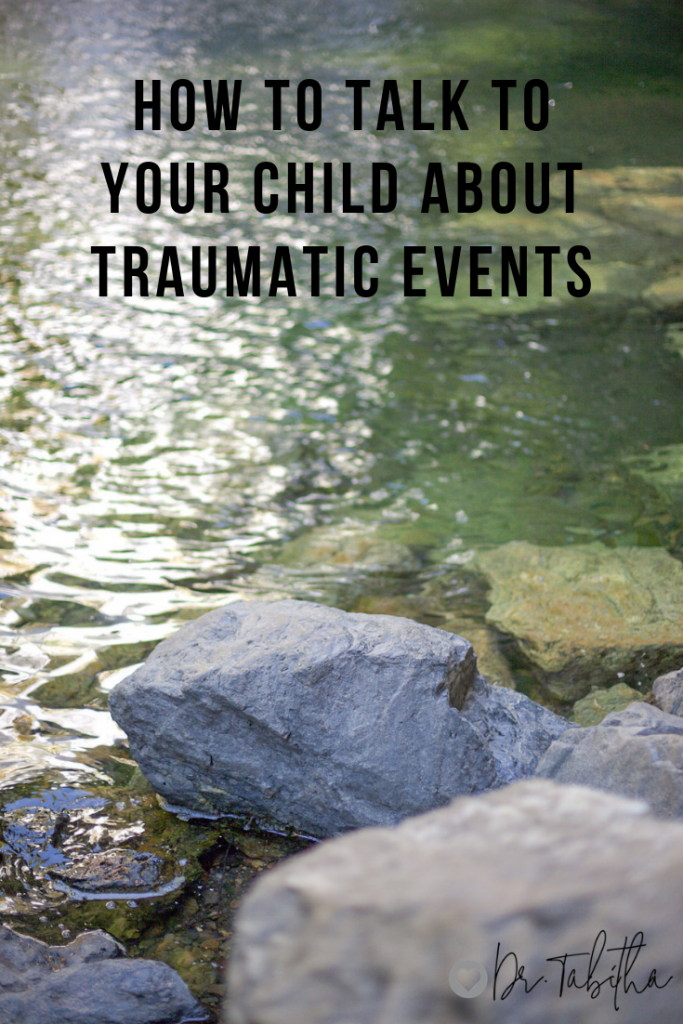
It seems that no matter where we turn these days there is a tragic event taking place. From natural disasters to mass shootings these events can be difficult for adults to wrap their heads around and understand. However, for children, processing these events can seem daunting and even more traumatic than the event itself. As much as you may try to shield your children from such information, they absorb information. Whether that is from their friends, overheared on the news channel or at school, they are likely to hear about traumatic events. This article gives some helpful information about how to start the conversation with your child about traumatic events broken down by age. Below are some tips to help your child understand and cope with tragic events.
It is okay to be upset.
This is an important time to validate not only your child’s emotional response but your own emotions as well. When upsetting things happen around us, it is okay to take some time to be sad or afraid. This is also the time to recognize that it may be difficult for your child to return to school or normal activities. This may because there is a heightened sense of fear or insecurity. Value that in your child and then offer reassurance that they are safe.
Maintain normal schedule.
It can be very tempting after a tragic event to want to keep your kids close to you for an extended amount of time. However, keeping with normal routines and structure helps children feel more safe and secure in their environment. As soon as is possible, return to normal activities. Make sure you talk through the fact that they are and have been safe in those situations in the past. Give them clear explanations of what is happening now and what will happen next.
Example: “It is time to go to school today. You are going to be safe in Ms. Doe’s class. Mommy will pick you up from school and we will go to the park. Then we’ll head home for dinner and a movie before bedtime.” Laying out the schedule for the day reassures them that they are safe and going to be taken care of. Plus, it gives them something to look forward to.
Answer questions with truth.
As much as you try to shelter your kids from the news, they inevitably get information. It is important to ask what they have already heard so that you can answer their questions with truth and dispel any rumors. It may make you uncomfortable but do not avoid your child’s questions, simply answer the question truthfully without giving too many details. When a child sees images, it can take on a different story in their minds. For instance if they see a man with a gun on the news, it may feel like there are a lot of men and that they are in the back yard. So, it is important to give facts and reassurance without overindulging information.
Example: If there has been an earthquake in a different part of the country you may say something like, “There was an earthquake far away and people were hurt. But, we did not have an earthquake here and you are safe.” This is a true statement that speaks to the event, while offering reassurance to your child.
Take a break.
It may help you, as an adult to watch the news for updates frequently or continue to scroll on your social media for the latest information. However, your children may not be able to handle that much information and it can make their fears or anxiety worse. So, try to limit the number of updates that you get. Take a break and play a game with the family or do another activity and only check for new information occasionally. This news break can be good for you as well, since an influx of distressing news has also been shown to increase anxiety in adults also.
Spend a bit more time and attention on your precious ones.
After a distressing event, spending time being engaged with your children can help to foster their feeling of safety and security. Try reading them an extra story or playing for a longer amount of time than usual. Most importantly, connect and engage with your child, don’t simply be in the room with them. Spending some quality time helps both them and you feel more connected and safe.
Model healthy coping.
Your children model your behavior; this is no secret. So, in times of great stress they look to their parents for how to react or respond. Make sure that if you are having an intense emotional reaction that you take the time you need. This may be for personal self-care by engaging in some healthy coping skills or by talking to a trusted friend or mental health professional. Make sure that you manage your emotions in front of your children so that they see how to manage a tough situation. If you “freak out”, they will “freak out” however, if you can remain calm and collected, it will help them to also stay calm.
Take action.
In moments of tragedy, it feels like life is outside of your control which can be most distressing. It has been found that taking some sort of action helps feel like you’re taking back some of the control of your life. This is also true for your children. They want to DO something to help. So, find age-appropriate activities that can help them find solace or provide a solution. This can be anything from praying for the people involved, to drawing pictures and/or writing cards, or volunteering at a local drop-off facility. Find some way to allow you and your children to take action. This will help them process and help others in the process.
Continue to be available.
Adults are able to process tragic events quicker than children. Continue to be available for your children to ask questions or seek reassurance from you. Keep that line of communication open since their young minds may take a while to fully process the event.
Tragic events are some of the most difficult to navigate both for adults and children. This is because most of the time, they are unexplainable and difficult for us to make sense of. Using the tips above you can help both yourself and your children process through an event as well as expected. Give yourself and your child some grace and forgiveness as there may be times that it is just too much. Especially if the event hits close to home. If you find that you or your children are struggling after such an event, do not be afraid to reach out for help. Parenting is a hard job and a therapist or mental health professional can be there for you. They can support and help guide you through life’s tough situations. If you would like some more information, click here to view a team who I highly recommend. Frances Chomic and Ida Holem specifically specialize in working with children and adolescents.






Leave a Reply
Your email is safe with us.